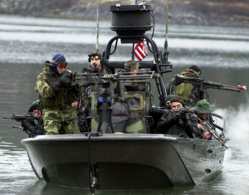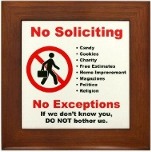|
SEAL is an acronym for SEa, Land, Air. The Navy SEALs are one of the
most elite special operations forces in the world. SEALs conduct special
operations alone or in small groups and are experts in weapons, tactics,
demolition, martial arts and hand-to-hand combat.
The first SEAL units were authorized by President Kennedy in 1962, as
the Navy's counterpart to the Army's Green Berets, but Navy SEALs
trace their heritage back to the elite frogmen of World War II, who were
called Amphibious Scouts and Raiders and Underwater Demolition Teams (UDT's).
|

Navy SEALs in action |
During WW II, the Navy needed personnel to perform reconnaissance on
areas where amphibious assaults were planned, so they recruited divers
from Naval Construction Battalions (SeaBees) and gave them advanced
training in reconnaissance and demolition. The frogmen scouted the
beaches and cleared the approaches of mines and obstacles prior to the
amphibious landings in Africa and Europe and during the island hopping
campaigns in the Pacific theater.
During the Korean War, the frogmen attacked railroad bridges and tunnels
along the Korean coastline. They also cleared mines and obstacles before
the amphibious assault at Inchon.
Once the first SEAL teams were created, they were sent to Vietnam as
advisors, instructing the South Vietnamese Navy in underwater
demolitions and maritime special operations. Later, the US Navy
maintained 8 platoons of SEALs that conducted special operations on a
continuing basis throughout North and South Vietnam. They patrolled
rivers, destroyed obstacles and bunkers, snatched prisoners, and
eliminated enemy leaders and political figures. SEAL teams had a kill
ratio of 200 to 1 in Vietnam. The enemy feared the SEALs and put a
bounty on their heads, calling them "Men with green faces"
because of their camouflage makeup.
SEAL teams provided beach reconnaissance prior to the invasion of
Granada in 1983. During the invasion they assaulted the airfield and
then set up radar beacons to guide the aircraft carrying airborne Ranger
battalions. They also captured the Radio Free Grenada transmitting
station so that the enemy couldn't use it to rally his forces. SEALs
also carried out an assault on the Governor General's Mansion and
rescued Governor General Paul Scoon, who was being held there under
house arrest.
In the invasion of Panama in 1989, SEAL teams were assigned two missions
designed to prevent the escape of the dictator Manuel Noriega; disabling
his boat and his Lear jet. The mission to disable his boat went as
planned, but the assault on Patilla Airfield to disable Noriega's Lear
jet ran into fierce resistance. Four SEALs were killed and eight were
wounded during the mission.
During both Iraq wars (1991 and 2003), the SEALs carried out a number of
missions, most of which are still classified. It is known that SEALs
were involved in the rescue of Navy pilots, mine clearing operations and
the capture of ships and oil platforms.
In 1994, SEAL teams provided beach reconnaissance for the Marine landing
in Somalia during the UN peacekeeping mission and at least one SEAL
member participated in the failed attempt to capture the warlord General
Mohammed Farrah Adid.
Since the terrorist attacks on 9/11/2001, SEAL teams have conducted many
covert missions inside Iraq, Afghanistan, and Pakistan in support of our
military objectives.
During the war in Afghanistan in 2002, SEAL teams discovered an
extensive network of tunnels in eastern Afghanistan that contained
nearly a million pounds of ammunition and equipment.
On May 2, 2011, Osama bin Laden was shot and killed inside a private residential compound in
Abbottabad, Pakistan where he had been hiding for at least the previous
five years. Navy SEAL Team 6 and CIA operatives participated in the
joint covert operation ordered by President Barack Obama.
SEAL Training
SEAL training is conducted at the Naval Amphibious Base, Coronado,
California. The six-month basic training course is mentally and
physically demanding and is designed to test the individual's stamina,
leadership and ability to work as part of a team. During the 18-week
advanced training period, SEALs are instructed in airborne assaults,
counter-terrorism, small-unit tactics, long-distance reconnaissance,
supply interdiction and raids.
Famous SEALs
Rudy Boesch became famous after his appearance on the first season of
television's Survivor program. He joined the Navy in 1945 and
volunteered for the Amphibious Scouts and Raiders. Later he completed
UDT (Underwater Demolition Team) training in 1951. In 1962, he was one
of the first men selected to join the original SEAL team. Rudy retired
from the Navy in 1990, after 45 years of distinguished service.
Former professional wrestler, actor and Governor of Minnesota, Jessie
"The Body" Ventura served as a Navy SEAL in Vietnam.
Former Nebraska Senator Bob Kerrey lead a SEAL team in Vietnam that was
nicknamed "Kerrey's Raiders." He was awarded the Medal of
Honor, "For conspicuous gallantry and intrepidity at the risk of
his life above and beyond the call of duty." Kerrey led an assault
on an enemy headquarters and was severely injured when a grenade landed
at his feet. Though bleeding profusely and suffering great pain he led
his men in the assault, called in fire support on the radio and directed
the evacuation of the prisoners that were captured.
|




